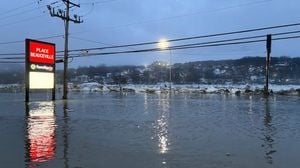Environmental protection efforts by the Instituto Estadual de Meio Ambiente e Recursos Hídricos (IEMA) have been pivotal in Espírito Santo, particularly focusing on air quality monitoring and combating illegal wildlife trapping. With 19 air quality monitoring stations spread throughout the state, including key locations like Grande Vitória and Aracruz, IEMA actively tracks pollution levels to safeguard public health.
According to Vinícius Rocha, the Coordinator of Air Quality at IEMA, the network of stations employs advanced analyzers to measure various pollutants present in the atmosphere. "Uma estação de monitoramento da qualidade do ar, ela é composta por analisadores. Cada poluente... os poluentes são, basicamente, material particulado," Rocha elaborated. Each station is uniquely equipped to monitor specific pollutants relevant to its surrounding areas. For example, urban regions like Grande Vitória show higher levels of particulate matter, whereas others exhibit elevated vehicular emissions.
Recent evaluations indicate positive trends, as more than 98% of air quality measurements across Espírito Santo have classified the air as good. Plans are already underway to bolster this extensive monitoring system, with IEMA intending to expand the network by adding three more stations by 2026. This initiative aims to strengthen environmental oversight and provide residents with reliable air quality information.
Nonetheless, IEMA's commitment to environmental preservation extends beyond air quality. A recent operation conducted in Aracruz has highlighted another pressing concern: illegal wildlife captivity. Partnering with the Polícia Militar Ambiental (PMA), IEMA has been actively engaged in dismantling illegal wildlife trafficking networks. During one operation, authorities seized 49 illegally kept birds along with several traps and cages.
Cosme Carvalho, the Coordinator of Fauna, emphasized the importance of these actions. "Estamos averiguando denúncias e aplicando as penalidades previstas em lei. Esse trabalho é fundamental para a preservação ambiental," he said. This operation is part of IEMA's comprehensive strategy to protect wildlife and educate the public on legal wildlife ownership. Carvalho advises civilians to be vigilant and verify the origins of animals purchased from commercial sellers.
He stated, "Esses animais só podem ser comercializados por criadores devidamente registrados e com documentação legal," urging anyone who observes illegal sales to report them. IEMA encourages citizens to come forward voluntarily with any illegally held wildlife without facing penalties. This aim is both to promote legal compliance and to facilitate the preservation of native species.
Public awareness is key to IEMA's success. Besides conducting inspections, IEMA undertakes educational initiatives to inform residents about the legalities surrounding wildlife ownership and the ecological significance of protecting biodiversity.
Rocha points out how urban activities can inadvertently affect air quality. He noted, "A gente observa também que... atividades urbanas interferem diretamente no nosso monitoramento." Construction projects, such as road resurfacing, can temporarily skew data collected, emphasizing the need for continuous adaptation and monitoring strategies by IEMA.
The information related to air quality and wildlife conservation efforts is accessible to the public through IEMA's online platform. By visiting IEMA's website, residents can access detailed reports on air quality and learn about the distinctive characteristics of their local environments.
IEMA's dual approach of utilizing advanced technology for air quality monitoring and rigorous enforcement of wildlife protection demonstrates its commitment to environmental stewardship. With the integration of community efforts and transparency in operations, Espírito Santo is taking significant strides toward achieving comprehensive environmental awareness and sustainability.



